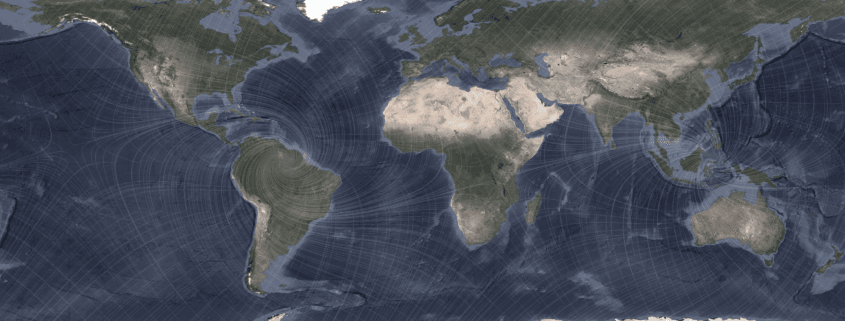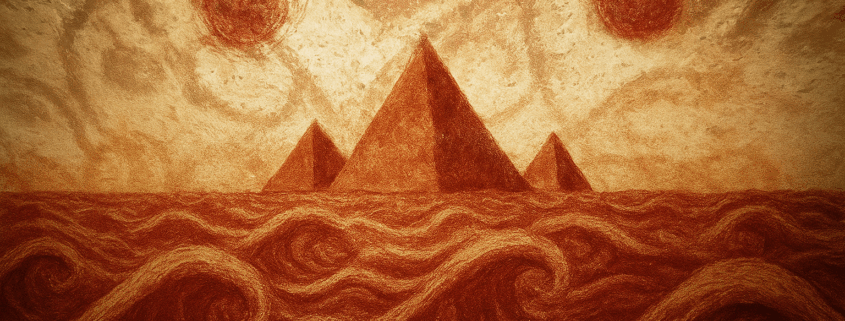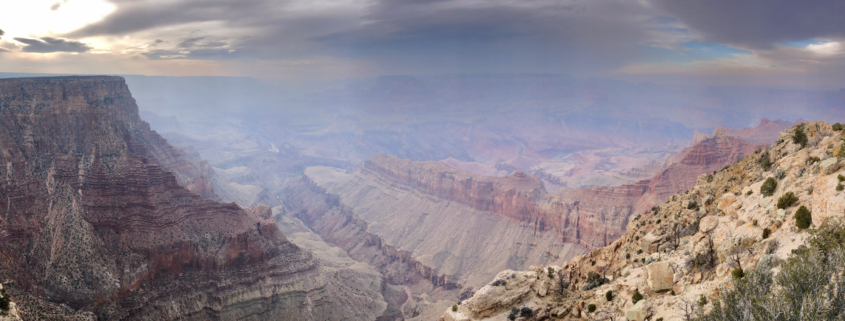The occasion reminds me of a wider question. When the fated day of deluge comes, after what fashion will the earth for the most part be over whelmed by the waves? Will it be by the strength of Ocean and the rise of the outer sea against us? Or will the rain descend uninterruptedly, and will summer be cut out of the year while persistent winter bursts its clouds and pours down endless masses of water? Or will earth herself open new reservoirs and shed forth rivers more abundantly? Or will a single cause be insufficient to produce such a catastrophe, and all the methods conspire together, the rains descending and the river floods rising, and the seas hurrying in hot haste from their place all agencies in concert bent upon the one aim, the destruction of the human race?
The last is the truth.
Nature finds no difficulties in compassing her ends, especially when she hastens to make an end of herself. At the creation of things she economises her efforts, putting forth her energy in small imperceptible increase: for destruction she comes with sudden and irresistible might. How long a time is needed to bring the embryo child to the birth! How great the toil called for in rearing the tender infant! How careful the nurture through which the frail body is at length brought to manhood! But how insignificant the effort needed to undo it all! Cities take centuries to establish: an hour brings their ruin. Ages rear the forest: a moment turns it to ashes. To its stability and vigour this universe of things calls for great and constant protection; quickly and suddenly dissolution comes. Deviation by nature from her established order in the world suffices for the destruction of the race.
So when that day of fate comes, many causes will be at work in fulfilling its decrees; and as some, including Fabianus, think, such a change will not come without a shock to the whole universe. In the first instance there will be excessive rainfall, a dull leaden sky with never a glimpse of the sun. The clouds will be unbroken, the gathering moisture will cause thick darkness, and there will be no winds to lick it up. Hence the crops will be diseased, the grain ere it be grown will wither without fruit. All tillage of mans hand will be ruined; marsh grass will spring up over all the plains. Presently the stronger plants feel the strain; their roots are loosened, and the pollard elms fall forward, carrying their vines with them. All shrubs lose their hold on the soil, which has become soft and flabby. Soon the ground is so saturated that it can support neither grain nor fruitful pasture. The stress of famine is felt, and recourse is had to the ancient sustenance of berries.
The fruit is shaken from ilex and oak, and any other tree that has been able to keep its ground by the support of the clefts of the rocks in the mountains. Roofs are sodden and rickety; the rain has penetrated to the depths, and the foundations sink.
The ground is all a marsh. It is vain to seek supports to the tottering houses; every foundation is set on slippery ground, and in the muddy soil nothing is firm. After the storm-clouds have more and more densely massed, and the accumulated snows of centuries have melted, a cataract sweeps down from the lofty mountains carrying before it the woods now insecure in their place, tearing off boulders from their fastenings, and whirling them down in fierce career. It washes off the country houses, and takes down with it flocks of sheep among the debris. The smaller hamlets it carries off as it passes, but at length it leaves its course and rushes in fury upon the larger homesteads.
It draws in its career whole cities, inhabitants, and buildings all mixed together: people know not whether to complain of a catastrophe or a shipwreck. So utterly crushed are they and at the same time submerged by its coming.
By and by, as it advances, the cataract is swollen by the absorption of other torrents, and in devastating course roams through the whole plain. Finally, it holds universal sway; it has earned a title by the widespread destruction of the world which it carries as its burden. The rivers, too, originally large, have been so hurried down by the storms that they have left their channels. The Rhone, the Rhine, the Danube, even when confined within their banks, have an impetuous torrent.
What, suppose you, are they now that they have overflowed and made themselves new banks, and, cutting through the soil have all wandered from their wonted course? With what headlong rush they roll down! The Rhine overspreads the plains, but the wideness of the space causes no slackening of its energy; it pours its waters in full force over the whole extent as if it were rushing through a gorge. The Danube no longer washes the base, or even the middle, of the mountains; it lashes the very summits, bearing down with it the mountain sides it has flooded, the crags it has overturned, the beetling promontories through whole provinces; it undermines their foundations, and carries them far off from the mainland. And, after all, the river finds no exit for it had closed up every passage against itself but returns in a circuit, and envelops in one vast whirlpool the huge expanse of lands and cities.
Meantime the rains continue, the sky becomes still more threatening, and thus, for long, disaster is heaped upon disaster. What was once cloud is now profound night, and that, too, dread and terrible, with gleams of lurid light between. For frequent flashes show, and squalls disturb the sea. Then for the first time, feeling the increase from the rivers, and too narrow to contain itself, the main advances its shores. Its own bounds cannot contain it, and yet the torrents from land prevent its escape, and drive back its waves. Still, the greater part of the torrents detained by their narrow mouth recoil in pools, reducing the fields to the aspect of a continuous lake. Now everything, far as the eye can reach, is a waste of waters.
Every hill is hidden in the abyss, everywhere is n fathomless depth of water. Only in the highest mountain tops are there shallows. To these heights men have fled with wives and children, and have driven up their cattle. All intercourse and communication have been cut off among the wretched survivors; for all the lower ground has been filled by the waves. The remnants of the human race cling to every lofty peak. Brought to the last shift, they have this one solace, that apprehension has passed into stupor. Astonishment so fills them that there is no room for fear. Even grief finds no place; for it loses its force in one whose wretchedness has passed beyond perception of suffering. So there are only mountain tops that appear like islands above the water, and increase the number of the scattered Cyclades, as that accomplished poet finely says; with an exaltation of language too in keeping with his theme, he exclaims:
All was sea; to the sea there was no shore.
It is a pity he reduced that burst of genius and his splendid subject to childish twaddle by adding:
The wolf has to swim among the sheep, the wave carries tawny lions.
There is too little seriousness in making sport in this way when the earth has been swallowed up. He expressed a fine thought and caught a vivid picture of the utter confusion when he said:
Through the open plains the rivers wander at their will, …The towers totter and sink beneath the flood.
That was splendid, if he had not minded what the wolf and the sheep were doing. Could anything, in fact, swim amid such deluge and destruction? Was not every hoof drowned in the same torrent as carried it off? You conceived a worthy image, Ovid, when all the world was overwhelmed, and the sky itself descended upon earth. Keep it up. You will know what it ought to be if you reflect that the whole world was afloat. Now we must return to our discussion.
There is a section of philosophers who hold that while the earth may be greatly harassed by excessive rains, it cannot be overwhelmed by them. By a mighty blow this mighty earth must be smitten. Rain will spoil the crops, hail will knock off the fruit; but the rivers will only be swollen above their banks, and will subside again. Some, again, are satisfied that the cause of the widespread destruction will be derived from the movements of the sea.
The great shipwreck of the world cannot, they think, arise from injury by cataract, river, or rain. I am willing to grant that when that day of destruction is at hand, and Heaven is resolved to create a new race of men, the rain will pour down incessantly, and there will be no limit to the floods, the north and other dry winds will cease to blow; the south will bring up in plenty clouds and rain and stream.
But hitherto only damage has been inflicted. The crops are laid low, and to the grief of the farmer, All hope of increase is abandoned; the toil of the long year is wasted and vain.
But for our purpose the earth must be more than damaged, it must be submerged. In fact, the disasters described are merely the prelude to destruction. After that, the seas swell far beyond their wonted bounds, sending out their waves far above the farthest high-water mark of the most violent tempest. The winds will urge them on from the 3 rear, rolling up huge billows that will break far inland out of sight of the highest shore. In course of time the shore will thus be shifted forward, the deep will be established in a realm that is not its own; the mischief will come nearer, and from its new base the tide will issue still from the deepest recesses of the main. For just like atmosphere and ether, this element, sea, has a large reserve, and in its depth is far more copious than appears to the eye. This reserve, moved by fate, not merely by tides for tides are but the agency of fate raises and drives before it a gulf of vast extent. Then in wondrous wise it rears its crest, and overtops all man’s refuges of safety. Nor do the waters find this a hard task, since, if the heights were calculated, it would be found that the sea mounts from an elevation equal to that of earth. The surface of the sea is of uniform level; for the earth itself as a whole is uniformly level. Hollows and plains are everywhere below the general level.
But the whole globe is as a matter of fact formed into a regular sphere, while in part of it is the sea, which unites to form the unity of a single ball. But just as when one looks out across a plain, the ground that sinks gradually deceives the eye, so we are not aware of the sea’s curvatures, and all that is visible is a plain. But being on a level with the earth, the sea does not require to raise itself to any great height in order to overflow. In order to overtop what is on a level with it, it need make only a slight rise. Besides, the flow of it does not proceed from the shore where it is lower, but from mid ocean where the heap in question stands. Therefore, as the tide at the equinox soon after the conjunction of moon and sun rises to a height greater than at any other time of year; in like manner this one that is sent out to seize upon the earth must exceed in violence the highest of ordinary tides, and bear a far greater volume of water; nor does it begin to ebb until it has swollen above the peaks of the mountains that are its objective. Some localities have at present a tide that runs up inland for a hundred miles in ordinary course harmlessly. It flows up to its normal limit and then ebbs again.
But when the time of deluge comes, the tide, freed from all restraint, will set no limit to its advance. In what way? you say. Just in the same way as the great conflagration is destined to take place. Both will take place when God has seen fit to end the old order, and bring in a better. Fire and water are lords of the earth. From these it took its rise, and in these it will find its grave. So when a new creation of the world has been resolved upon by Heaven, the sea will be let loose on us from above; or it may be the raging fire, if another variety of destruction is Heaven’s will.
Some suppose that in the final catastrophe the earth, too, will be shaken, and through clefts in the ground will uncover sources of fresh rivers which will flow forth from their full source in larger volume. Berosus, the translator of [the records of] Belus, affirms that the whole issue is brought about by the course of the planets. So positive is he on the point that he assigns a definite date both for the conflagration and the deluge. All that the earth inherits will, he assures us, be consigned to flame when the planets, which now move in different orbits, all assemble in Cancer, so arranged in one row that a straight line may pass through their spheres. When the same gathering takes place in Capricorn, then we are in danger of the deluge. Midsummer is at present brought round by the former, midwinter by the latter. They are zodiacal signs of great power seeing that they are the determining influences in the two great changes of the year. I should myself quite admit causes of the kind. The destruction of the world will not be determined by a single reason.
But I should like to apply in this connection as well, a principle which we Stoics adopt in regard to a conflagration of the universe. Whether the world is a soul, or a body under the government of nature, like trees and crops, it embraces in its constitution all that it is destined to experience actively or passively from its beginning right on to its end; it resembles a human being, all whose capacities are wrapped up in the embryo before birth. Ere the child has seen the light the principle of beard and grey hairs is innate. Albeit small and hidden, all the features of the whole body and of every succeeding period of life are there. In like manner the creation of the world embraces sun and moon, stars with their successive phases, and the birth of all sentient life; and no less the methods of change in all earthly things. Among the latter is flood, which comes by a law of nature just as winter and summer do. So, that catastrophe will not be produced simply by rain, but rain will contribute: nor by inroads of the sea, but these inroads will con tribute: nor by earthquake, but earthquake will contribute. All elements will aid nature, that nature’s decrees may be executed. The chief cause of its inundation will be furnished by the earth herself, which, as has been already said, is subject to transmutation, and may dissolve in moisture.
Therefore, there will one day come an end to all human life and interests. The elements of the earth must all be dissolved or utterly destroyed in order that they all may be created anew in innocence, and that no remnant may be left to tutor men in vice. There will be more moisture then than there ever was before. At present the elements are all carefully adjusted to the parts they have to fulfil. To destroy the equipoise in which the balance stands, there must be some addition to one or other of them. The addition will be to moisture.
It has, at present, power to surround, but not to overwhelm the earth. Any addition to it must of necessity overflow into ground that does not now belong to it. So the earth as the weaker is bound to yield to sea which has gathered unnatural strength. So it will begin to rot, then to be loosened and converted into moisture, and to waste away by the continuous drain. Rivers will then issue forth beneath mountains, shaking them to the foundations by their fury; then they will flow on in silence without a breath of air. The soil will everywhere give forth water; the tops of mountains will pour it out, just as disease corrupts what is sound, and as an ulcer taints its whole vicinity.
The nearer the part is to the soil that is being liquefied, the more quickly will it be washed off, dissolved, and finally carried away. The rock will everywhere gape in fissures, and the fresh supplies of water will leap down into the gulfs, and unite in forming one great sea. There will be no Adriatic any longer, no strait in the Sicilian Sea, no Charybdis, no Scylla. All the fabulous dangers will be swallowed up in the new sea; the existing Ocean which surrounds the fringes of the earth will come into the centre.
Nor will this be all. As if this were not enough, winter will seize upon months that are not his, summer will be stopped, the heat of every heavenly body that dries up earth’s moisture will be quenched and cease. All these names will be obliterated Caspian and Red Sea, Ambracian and Cretan Gulfs, the Pontus and the Propontis. All distinctions will disappear. All will be mixed up which nature has now arranged in its several parts. Nor will walls and battlements afford protection to any. Temples will not save their worshippers, nor citadels their refugees. The wave will anticipate the fugitives, and sweep them down from their very strong hold. Some enemies will hasten from the west, others from the east. A single day will see the burial of all mankind. All that the long forbearance of fortune has produced, all that has been reared to eminence, all that is famous and all that is beautiful, great thrones, great nations all will descend into the one abyss, will be overthrown in one hour.
Nature, as I have said, finds no task hard, and especially one resolved upon from the beginning, to which she does not come of a sudden, but of which long warning has been given. From the world’s first morning, when out of shapeless uniformity it assumed this form it wears, nature’s decree had fixed the day when all earthly things should be overflowed. Nay, from of old the seas have practised their strength for this purpose, lest at any time destruction as a strange work might be found difficult to compass. Do you not see how the breaker dashes against the beach as if it wished to leave its element? Do you not see how the tide sometimes crosses its bounds and installs the sea in possession of the land? Do you not see how unceasing is the war it wages against its barriers? But what special apprehension need there be of the sea, the place where you see such turmoil, and of the rivers that burst forth in such fury? Where has nature not placed water? She can attack us on all sides the moment she chooses. I can give my own word of honour for it that water meets us as we turn up the soil; every time our avarice sends us down a mine, or any other motive induces us to sink a shaft deep in the earth, the end of the excavation is always a rush of water.
Remember, too, that there are huge lakes hidden deep in the earth, great quantities of sea stored up, and many rivers that glide through the unseen depths. On all sides, therefore, will be causes of deluge; for some waters flow in beneath the earth and others flow round it. Though long restrained they will at last prevail, and will join stream to stream and pool to marsh. The sea will fill up the mouth of every fountain, and will open it out to wider extent. Just as the bowels drain the body in the draught, or as the strength goes off into perspiration, so the earth will dissolve, and though other causes are inactive, it will find within itself a flood in which to sink. All the great forces will thus, I should suppose, combine. Nor will destruction tarry. The harmony is assailed and broken when once the world has relaxed aught of its needed care. At once, from all sides, open and hidden, above and beneath, will rush the influx of waters.
There is nothing like the letting loose of the seas full force, for violence and ungovernable fury; it rises in rebellion and spurns every restraint. It will make full use of its permitted liberty; as its nature prompts, what it rends and surrounds it will soon fill up. Just as fire that breaks out at different points will speedily unite the flames and make one grand blaze, so the overflowing seas will join forces in an instant.
But the waves will not enjoy their unrestrained liberty for ever. When the destruction of the human race is consummated, and when wild beasts, whose nature men had come to share, have been consigned together to a like fate, the earth will once more drink up the waters. Nature will force the sea to stay its course, and to expend its rage within its wonted bounds. Ocean will be banished from our abodes into his own secret dwelling-place. The ancient order of things will be recalled. Every living creature will be created afresh. The earth will receive a new man ignorant of sin, born under happier stars. But they, too, will retain their innocence only while they are new. Vice quickly creeps in; virtue is difficult to find; she requires ruler and guide. But vice can be acquired even without a tutor.










